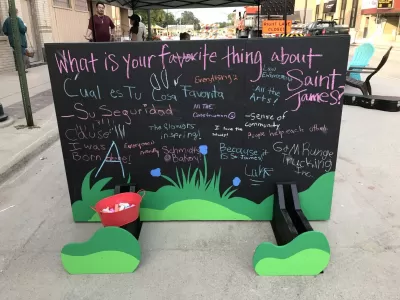An in-depth look at the lessons one housing organization learned after receiving a multimillion grant to integrate arts and culture strategies in its work. Has the organization changed the way it operates?

It wasn’t a typical staff meeting. Everyone was sitting in a circle, and the facilitator had handed out pipe cleaners and playing cards and instructed the participants to use the objects to create an image about their day. A few were apprehensive at first—playing with pipe cleaners seemed more suited to a first-grade classroom than one’s workplace—but, following the lead of the facilitator, artist Ashley Hanson of PlaceBase Productions, they were learning to trust the process, worrying less about the result and concentrating more on the task of getting there. So they went for it, twisting, bending, folding, each coming up with their own unique creation. One by one, the participants presented what they had made. And with each sharing, a collective story about the people in the room began to emerge.
The group was the staff of the Southwest Minnesota Housing Partnership (SWMHP). Founded in 1992 with a mission to support the economic development of communities throughout southwest and south-central Minnesota, SWMHP had a longstanding track record of creating affordable housing and homeownership opportunities. In the world of community development, the organization’s many accomplishments had followed what some might call a conventional path: listening sessions and surveys, city council meetings, funding applications, and endless puzzling over how—with limited resources—to build functional, well-designed homes.
But now SWMHP was defying convention. In 2015, the organization became one of six community development organizations in the country to be awarded a $3 million grant from ArtPlace America through its Community Development Investment (CDI) program. The three-year initiative challenged grant recipients to explore sustainable ways of integrating arts and culture into their core operations. That art could serve a practical purpose, as much as any spreadsheet or survey, was a new and exciting concept to the leadership team at SWMHP—exciting enough that they applied for the CDI grant and won it. Now, sitting in a circle with their pipe cleaners and playing cards, they wondered what exactly they had gotten themselves into.
...
FULL STORY: How Artists Helped a Housing Organization Adapt to Demographic Change

Maui's Vacation Rental Debate Turns Ugly
Verbal attacks, misinformation campaigns and fistfights plague a high-stakes debate to convert thousands of vacation rentals into long-term housing.

Planetizen Federal Action Tracker
A weekly monitor of how Trump’s orders and actions are impacting planners and planning in America.

Chicago’s Ghost Rails
Just beneath the surface of the modern city lie the remnants of its expansive early 20th-century streetcar system.

Bend, Oregon Zoning Reforms Prioritize Small-Scale Housing
The city altered its zoning code to allow multi-family housing and eliminated parking mandates citywide.

Amtrak Cutting Jobs, Funding to High-Speed Rail
The agency plans to cut 10 percent of its workforce and has confirmed it will not fund new high-speed rail projects.

LA Denies Basic Services to Unhoused Residents
The city has repeatedly failed to respond to requests for trash pickup at encampment sites, and eliminated a program that provided mobile showers and toilets.
Urban Design for Planners 1: Software Tools
This six-course series explores essential urban design concepts using open source software and equips planners with the tools they need to participate fully in the urban design process.
Planning for Universal Design
Learn the tools for implementing Universal Design in planning regulations.
planning NEXT
Appalachian Highlands Housing Partners
Mpact (founded as Rail~Volution)
City of Camden Redevelopment Agency
City of Astoria
City of Portland
City of Laramie





























